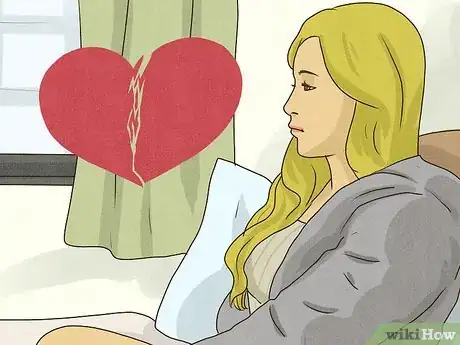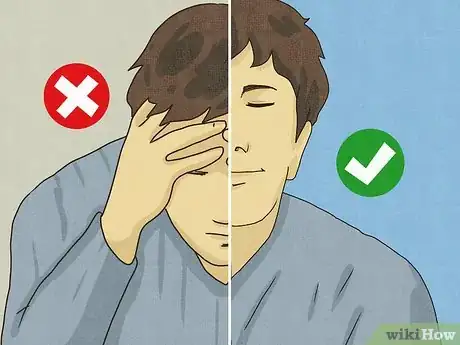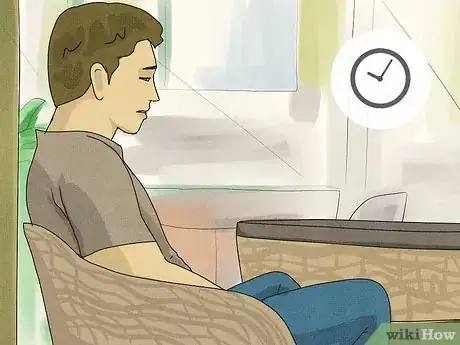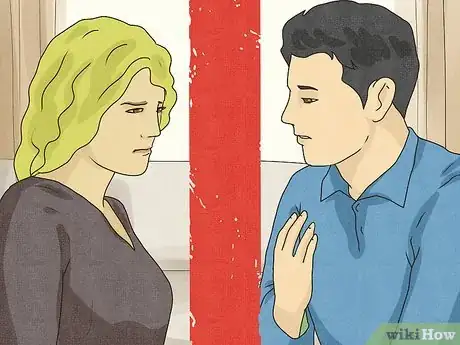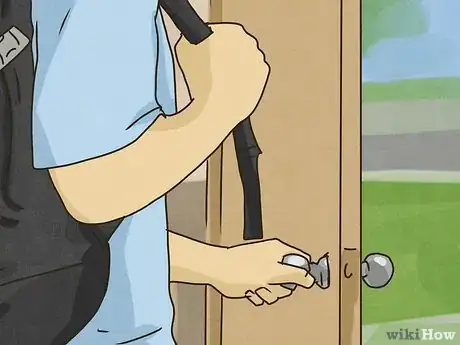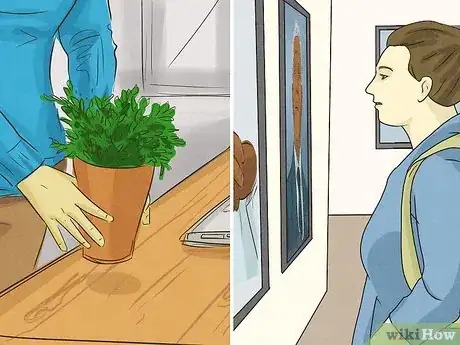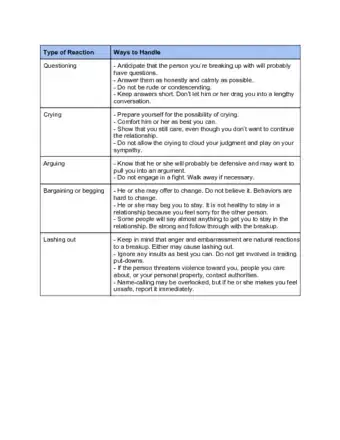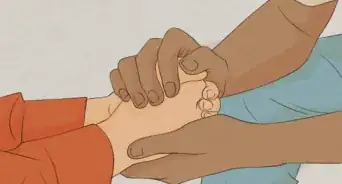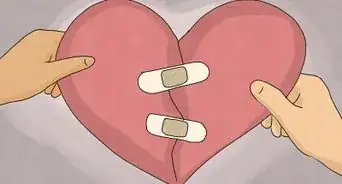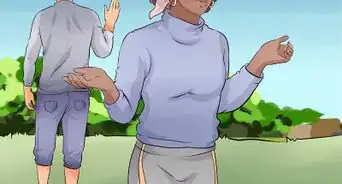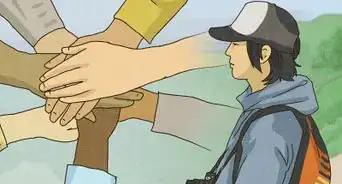This article was co-authored by Elvina Lui, MFT. Elvina Lui is a Licensed Marriage and Family Therapist specializing in relationship counseling based in the San Francisco Bay Area. Elvina received her Masters in Counseling from Western Seminary in 2007 and trained under the Asian Family Institute in San Francisco and the New Life Community Services in Santa Cruz. She has over 13 years of counseling experience and is trained in the harm reduction model.
wikiHow marks an article as reader-approved once it receives enough positive feedback. This article received 16 testimonials and 81% of readers who voted found it helpful, earning it our reader-approved status.
This article has been viewed 1,233,056 times.
Ending a relationship is never easy. Though many people believe otherwise, ending a relationship can be just as emotionally exhausting as getting dumped. Before making a decision to end a relationship, you should always weigh the reasons for walking out. Once you are sure, though, it's important to remember that your soon-to-be ex was once your love. You should be honest without being cruel, and compassionate without giving the person hope. With a little tact and thoughtfulness, you can end the relationship and minimize the potential emotional damage. Be careful, it may hurt you too.
Steps
Getting Ready to End the Relationship
-
1Make sure you want to end the relationship. Don't use the threat of leaving as a tool to get your own way in an argument. If you say it, be prepared to back it up with the action, or else take the threat off the table before you make it. Discuss problems openly and directly with your partner before you make up your mind. Many people suffer for years and never bring problems up with their partners, which is what leads to many breakups.[1]
- If you really want to end the relationship, then you should make a list of all the reasons you're unhappy in the relationship -- and all the reasons those things can't be fixed.
-
2Make your decision with a clear head. Don't decide to break up with your partner in the heat of the moment, when you're feeling unstable, or after you've had a bad week and are blaming your relationship for all of your problems. Before you make this important decision, take the time to get input from trusted friends and parents, people who may have helpful insight into your relationship issues.
- Once you've decided to break up with your partner, don't go around telling your close friends, or anyone at all, or it may get back to that person. It's okay to come to a close friend or family member for advice, but once you've made your decision, the mature thing to do is to tell your partner next.
Advertisement -
3Choose your time and place wisely. Choose a time and place that will allow for both you and the person that you're about to dump some privacy.[2] Don't break up with someone right before they have a big test or are about to go to work. Fridays are a suitable choice if it gives your soon-to-be-ex the weekend to recover somewhat.
- Don't break up with your partner in your favorite restaurant, bar, or your favorite spot in a park. Pick a neutral location that has no special meaning for either of you.
- Pick a time when you know you'll be in a relatively calm emotional state. Don't break up with your partner after you know you'll be staying late for a stressful meeting at work.
-
4Make sure to end the relationship in person (under most circumstances). To give your significant other the respect that they deserve, you should end the relationship in person, no matter how much you're dreading it.
- The only time it's acceptable to end the relationship over the phone is if you're in a long-distance relationship and know you won't see each other for a while, or if you're in a controlling or manipulative relationship. If your ex is prone to outbursts, violence, or manipulative behaviors, it is much safer for you to end the relationship at a distance.
Ending the Relationship
-
1Be firm about breaking up. Be firm in what you say––being wishy-washy in the vain hope that you'll let the other person down "easy" will only cause more hurt in the end. A break-up does not need to be a dramatic, escalating event. Get to the point and say that you don't want to be in the relationship anymore, that it isn't working for you. Doing otherwise leads the door open for argument.[3]
- Avoid any comment that gives the impression that this is a trial separation and that you might resume things after a break.
- You may think that it'll ease the pain to tell your partner "I'm not ready for this right now" or "Maybe this can work down the road..." but if you don't really mean it, then that will only be adding to your partner's pain.
-
2Be honest but not cruel. You don't want your partner to walk away feeling unsure about why the relationship was over, but you don't want them walking away knowing the top 20 things you don't like about them, either. Just be honest about why the relationship needs to end, whether it's because you're feeling suffocated, manipulated, or disrespected. Don't waste time beating around the bush.
- The hardest reason for a breakup is if you're just not in love anymore, because it's not that person's fault. In that case, you should still be honest, but say it as gently as you can.
- Once you've given your main reason, you don't have to go into all the details and rehash old arguments, unless the person is genuinely confused. There's no reason to bring up past problems and add insult to injury.
- Don't put the person down and make him feel insecure and worthless. Don't say, "I just want to be with a real man" -- instead, say, "I think you still have to work on developing your confidence."
- Whatever the reason is, it shouldn't be a complete surprise to the person. If you kept up open lines of communication, then it won't be coming out of nowhere.
- Avoid making a long list of reasons as to why you're dumping them. Boil down your well-thought-through reason to the essential problem: "We are not compatible enough in key areas," "I don't feel supported by you in my career path, and I don't want to change my path," "I want children and you don't," or other similar and specific details.
-
3Be prepared for a bad reaction. The person who is getting dumped will typically react with anger or with wonder, shock, or panic. If they respond with anger, try to remain calm and attempt to calm them down. Keep your voice at ease, even if they begin to yell. If it gets too out of control, just leave and let them cool down––but be sure you assure them that you will be willing to come back later, when they are calmer. Don't just say, "Oh forget it, I'm outta here."
- Comfort them if they need it, but don't take this too far. Voice your opinions if things are getting too uncomfortable or inappropriate. You don't want to be drawn down the same path that led you to this moment. Be compassionate, but be firm and cut the contact short if it seems to be escalating.
- If you're worried about leaving your ex alone, call a friend of theirs and explain what happened, where they are, and what you're concerned about, and what you want the friend to do. Apologize for the pain the situation has caused and thank this friend for helping and leave it at that.
- If your ex is furious to the point that nothing will get through to them just then, say, "It's not productive to just yell at one another. I've made my decision, and I won't change my mind, but I will talk with you if you can remain calmer. Take some time to settle down, and then call me - we can talk again then." If your ex does call, keep your word. Pick up the call. If there are questions, be honest and kind with your answers, but keep the conversation short and civil so you don't prolong the pain.
-
4Establish concrete boundaries for your future interaction. Once you have begun the process, be polite but firm about these boundaries, and make it clear that they are non-negotiable. It is permissible to cut them off without a chance to discuss what went wrong. Try to make the failed relationship as valuable as possible by turning it into a chance to learn and grow and as to what type of people to avoid.
- If you have mutual friends and want to avoid each other for a while, make a "joint custody" plan to see your friends without running into each other.
- If you both have a favorite coffee shop or go to the same gym every time, try to set a schedule that helps you avoid each other. You don't have to be too rigid or organized about this, but it can help you avoid the pain of running into each other.
- If you have each other's things or even live together, make a plan for sorting out your belongings as soon as possible so you don't have to keep seeing each other.
-
5Know when to walk away. One of the biggest mistakes made in ending a relationship is allowing the final death throes to go on and on. And on. And on. And on. It's one thing to finalize shared expenses, disentangle community property, etc. It's another thing to beat a dead horse endlessly.
- When discussions become circular––in other words, you just travel around and around the same points without coming to a point of resolution––stop. That's the moment to say, "I think we should continue this later, or not," and leave.
- If the person doesn't understand why you're breaking up with them, you can try to make things clearer in a letter or message. Say what you need to say, let the other person explain themselves in a message so they feel that they've been listened to, and leave it at that. It can be easier to disentangle when you're doing it while apart.
Living Life After the Break-Up
-
1Don't try to stay friends right away. Trying to "be friends" can prolong the agony of a breakup. Most often, it is best to make a clean break and spend time apart. After a time, perhaps three months, perhaps a year or more, when you see one another, it won't hurt as much, and maybe then you can try to be friends with a clean slate. Even then, be sensitive and respectful about what your ex needs––they may need more time than you. If that's the case, don't just foist yourself on the ex in an attempt to become friends some time later.[4]
- If your ex asks "Can we still be friends?", say, "No, we can't still be friends. For now, though, I think it's best we just let things end." If pressed, say, "Look, we started out as friends and went past that. To be friends, we'd have to go back, and frankly, I don't want to go back. We need to go forward now. That means we need to put some space between our broken relationship and any new relationship we might form. Let's take a break, take some time, and give each other the space we need to heal and move on. At some later point, when we meet again, we might be able to put our anger aside and be friendly. Let's leave it at that." However, make this the last contact between you two. Make the break final with no further contact ever.
- If there are mutual friends that are shared by the both of you, inform them of the breakup and also inform them that you will not appear at any functions that your ex-lover will be present at and if that means they have to choose sides, so be it.
-
2Take some time to deal with your loss. Sure, you're the one who did the breaking up, but in most cases, that doesn't mean you want to have a night on the town to celebrate your new freedom. What people don't understand is that the person who did the breaking up is often in just as much pain as the person who was dumped. In some cases, the person who does the breaking up feels even more pain, because he may also be plagued with feelings of guilt, even if they knew it was the right thing to do.
- After the break-up, take some time to yourself to re-evaluate your life and think about what you can do to be happy in the future.
- It's okay if you want to spend a week or two crying, writing in your journal, and just holing up in bed. But after that, it'll be time to get out in the world again and to slowly start to get back into the swing of things.
- Calling a good friend in your time of need can make you feel better. Going out to the clubs to get obliterated off alcohol the night after your breakup probably won't make you feel better. (Alcohol has the effect of intensifying emotions, good or bad, so it could actually make a lot worse.)
-
3Enjoy your post-relationship life. After a few weeks, or a few months have passed, you will slowly start to enjoy your life again. By now, you and your ex should have separated your things and have found a way to avoid each other, which should already be helping the healing process. Once you're starting to feel like yourself again, you should take pleasure in your friendships and your close relationship with your family, and pursue your old hobbies as well as pick up some new interests.
- If you want to start feeling like your old self, you should avoid doing the things that you and your ex loved to do together for a while, whether it's going hiking in your favorite spot or having drinks at a certain bar.
- Make some changes. To feel new, rearrange your furniture, clean your car, and pick up a new hobby you've never done before, such as volleyball or art class.
Additional Help
Expert Q&A
Did you know you can get expert answers for this article?
Unlock expert answers by supporting wikiHow
-
QuestionHow do you know if it's time to end a relationship?
 Elvina Lui, MFTElvina Lui is a Licensed Marriage and Family Therapist specializing in relationship counseling based in the San Francisco Bay Area. Elvina received her Masters in Counseling from Western Seminary in 2007 and trained under the Asian Family Institute in San Francisco and the New Life Community Services in Santa Cruz. She has over 13 years of counseling experience and is trained in the harm reduction model.
Elvina Lui, MFTElvina Lui is a Licensed Marriage and Family Therapist specializing in relationship counseling based in the San Francisco Bay Area. Elvina received her Masters in Counseling from Western Seminary in 2007 and trained under the Asian Family Institute in San Francisco and the New Life Community Services in Santa Cruz. She has over 13 years of counseling experience and is trained in the harm reduction model.
Marriage & Family Therapist If you are wondering if you want to end your relationship, first of all you examine how much you assert your needs, how clearly do you know what you want and need in life, and how clear are you about when to draw the line. Start listing out the things you want and even demand from your relationship. You might not have listed them out clearly before, but once you do, it will be your set of guidelines that will make everything clear. Examples of such demands: you need your partner to be emotionally supportive; your partner needs to take responsibility for their actions, and if they did something wrong, they need to apologize; you both need to spend time to bond with each other and to make time for each other. You might not have thought about relationships having bottom lines before, but rightfully we all have needs that should be respected. From a different angle, instead of breaking up as the one solution, maybe the relationship needs repair and improvement. In any case, if you are starting to be unhappy and wonder if you need to break up, something needs to be done.
If you are wondering if you want to end your relationship, first of all you examine how much you assert your needs, how clearly do you know what you want and need in life, and how clear are you about when to draw the line. Start listing out the things you want and even demand from your relationship. You might not have listed them out clearly before, but once you do, it will be your set of guidelines that will make everything clear. Examples of such demands: you need your partner to be emotionally supportive; your partner needs to take responsibility for their actions, and if they did something wrong, they need to apologize; you both need to spend time to bond with each other and to make time for each other. You might not have thought about relationships having bottom lines before, but rightfully we all have needs that should be respected. From a different angle, instead of breaking up as the one solution, maybe the relationship needs repair and improvement. In any case, if you are starting to be unhappy and wonder if you need to break up, something needs to be done.
Warnings
- Don't back down if he begins to cry. Remember why you're doing this!⧼thumbs_response⧽
- Don't say, "It's not you, it's me." That's offensive and trite, even if true. Most people are aware that this is code for "I am not telling you the real reason but it is something about you, only I lack the courage to say so."⧼thumbs_response⧽
- Avoid giving the hope that it can continue. If you have made the decision to move on, then you must make that absolutely clear. If there is still something salvageable, then don't break up. Instead, focus on how you will work together to salvage the relationship. Breaking up should not be a threat or a way to get someone to change.⧼thumbs_response⧽
- Never make them feel totally responsible for the breakdown of the relationship.⧼thumbs_response⧽
References
- ↑ https://www.psychologytoday.com/blog/wander-woman/201207/3-keys-ending-relationship-dignity
- ↑ https://www.psychologytoday.com/blog/sex-sociability/201405/how-end-relationship-and-how-not
- ↑ https://www.psychologytoday.com/blog/sex-sociability/201405/how-end-relationship-and-how-not
- ↑ https://www.psychologytoday.com/blog/valley-girl-brain/201211/sorry-is-why-you-can-t-be-friends-your-ex
About This Article
To end a relationship, start by choosing a time and place where you can meet privately to break the news to them. When you start the conversation, get straight to the point by stating in a clear way that you don't want to be in the relationship anymore. Explain why the relationship needs to end in a concise way rather than giving a long list of reasons why you're dumping them. Keep in mind that the person getting dumped will typically react with anger, shock, or panic, so prepare yourself for that. Stay calm and avoid getting into an argument about it--just state that you've made up your mind and that's that. For tips on how to act around each other after the breakup, read on!
